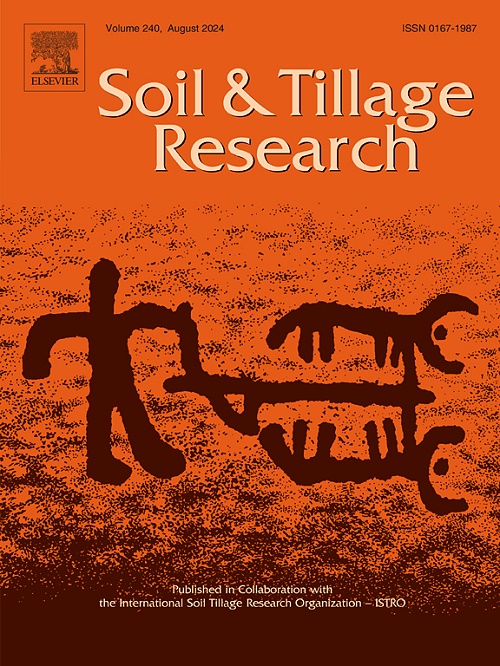Morphology-based mechanism of desiccation cracking in soil and montmorillonite
IF 6.1
1区 农林科学
Q1 SOIL SCIENCE
引用次数: 0
Abstract
Cracking from soil desiccation is a common phenomenon. Stress analysis based on transient spatial distribution of soil water and fracture mechanics has been extensively applied in studying the development of soil cracks. Nevertheless, the existing experiments and theoretical models for soil crack development generally ignore the interaction between cracks, and lack quantitative analysis of the transient evolution of crack length L(t) and crack strength I(t). This study explored the transient evolution of soil and montmorillonite shrinkage and cracking by analyzing the images from both field and laboratory experiments. Our study demonstrated that in the initial stages of drying, newly formed cracks accelerated the soil moisture evaporation near the crack opening interface, resulting in a rapid increase in stress, which promoted an exponential growth of the cracks. Subsequently, the general case where two or more parallel cracks have a mutual shielding interaction led to slowing down and saturation of their development. The experimental L(t) and I(t) curves for the S-shape could be well-fitted by introducing the existence of a competitive relationship between cracks. The experimental results also showed that the I(t) curve lagged behind L(t). The shielding effect between cracks was also supported by imaging of all crack samples. Hence, the single-crack model commonly used in traditional soil desiccation cracking studies is unsuitable for analyzing cracks in soil samples. Finally, the analysis of the concave-shaped soil shrinkage characteristic curve (SSCC) and the concave-shaped the soil water evaporation curve for all soil samples revealed that they could not explain the S-shaped L(t) and I(t) curves. Therefore, the plausibility of the single or isolated crack model for the evolution of soil drying and cracking was excluded. Finally, this experimental study proposed the hypothesis that the saturation phenomena of L(t) and I(t) are likely due to the competition between cracks for the release of strain energy caused by drying.
求助全文
约1分钟内获得全文
求助全文
来源期刊

Soil & Tillage Research
农林科学-土壤科学
CiteScore
13.00
自引率
6.20%
发文量
266
审稿时长
5 months
期刊介绍:
Soil & Tillage Research examines the physical, chemical and biological changes in the soil caused by tillage and field traffic. Manuscripts will be considered on aspects of soil science, physics, technology, mechanization and applied engineering for a sustainable balance among productivity, environmental quality and profitability. The following are examples of suitable topics within the scope of the journal of Soil and Tillage Research:
The agricultural and biosystems engineering associated with tillage (including no-tillage, reduced-tillage and direct drilling), irrigation and drainage, crops and crop rotations, fertilization, rehabilitation of mine spoils and processes used to modify soils. Soil change effects on establishment and yield of crops, growth of plants and roots, structure and erosion of soil, cycling of carbon and nutrients, greenhouse gas emissions, leaching, runoff and other processes that affect environmental quality. Characterization or modeling of tillage and field traffic responses, soil, climate, or topographic effects, soil deformation processes, tillage tools, traction devices, energy requirements, economics, surface and subsurface water quality effects, tillage effects on weed, pest and disease control, and their interactions.
 求助内容:
求助内容: 应助结果提醒方式:
应助结果提醒方式:


